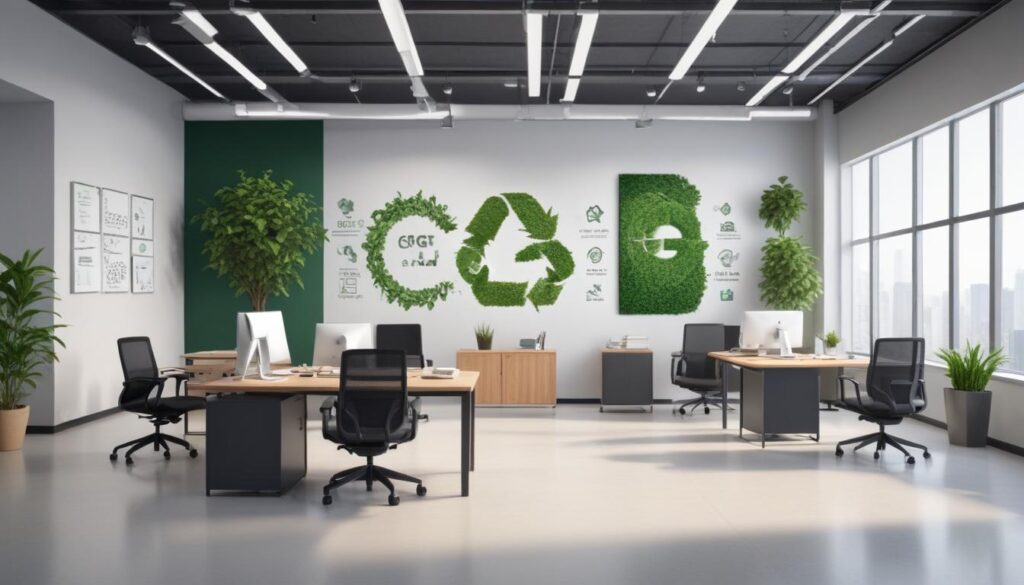Net Zero strategies in hospitality focus on reducing carbon emissions through energy efficiency, waste management, and staff engagement, ultimately enhancing sustainability and meeting the expectations of environmentally conscious travelers.
Net Zero is becoming a critical goal for many industries, especially hospitality. Curious about how Consultus supports hotels in achieving this? Let’s dive in!
Understanding Net Zero in Hospitality
Understanding Net Zero in the hospitality industry is crucial for sustainable development. As hotels face increasing pressure to reduce their carbon footprints, the concept of achieving net zero emissions becomes more relevant. This involves balancing the greenhouse gases emitted with an equivalent amount of carbon offsets or by eliminating emissions entirely.
Many hospitality businesses are now implementing strategies aimed at reducing energy consumption and enhancing energy efficiency. Innovations such as smart management systems and renewable energy sources are paving the way for a greener future. By investing in sustainable technologies, hotels can significantly lower their operational impacts.
The first steps toward reaching net zero often include conducting thorough energy audits and setting clear, attainable goals. These measures help identify areas for improvement and track progress over time. Furthermore, engaging staff and guests in sustainability practices fosters a culture of awareness and responsibility, which is essential for long-term success.
Ultimately, striving for net zero not only contributes positively to the environment but also enhances brand reputation, attracting eco-conscious travelers who value sustainability. As the hospitality sector evolves, embracing net zero strategies will be imperative for those wishing to maintain competitiveness in an increasingly environmentally conscious market.
The Role of Consultus in Sustainability
The role of Consultus in promoting sustainability in the hospitality industry is both impactful and essential. As businesses aim to cut their carbon footprints, Consultus provides strategic guidance and innovative solutions tailored for hotels. This assistance includes adopting energy-efficient technologies, reducing waste, and implementing water conservation measures.
Consultus emphasizes the importance of creating customized sustainability plans. By understanding the specific needs and operations of each hotel, they help develop a roadmap for achieving environmental goals. Their expertise in environmental consultancy ensures that clients receive actionable insights and support throughout the process.
An integral part of their approach is educating staff about sustainable practices, thus fostering an eco-friendly culture within the organization. This engagement not only empowers employees but also enhances guest experiences. When hotels actively promote their sustainability efforts, they attract a growing segment of eco-conscious travelers.
Moreover, the partnership with Consultus aids in compliance with increasingly stringent environmental regulations. By staying ahead of legal requirements, hotels mitigate risks and enhance their reputations. As sustainability becomes a defining characteristic of successful businesses, the guidance from Consultus becomes invaluable, positioning hotels as leaders in the shift towards a greener hospitality sector.
Challenges Faced by L+R Hotels
L+R Hotels face numerous challenges as they strive to implement sustainable practices within their operations. One major hurdle is balancing profitability with environmental responsibility. Many hotels struggle to invest in green technologies due to high upfront costs, despite the long-term savings they may provide.
Another significant challenge is managing guest expectations. While a growing number of travelers are eco-conscious, many still prioritize comfort and luxury. This can lead to conflicts between sustainable practices and customer satisfaction. For instance, reducing water usage or opting for energy-efficient appliances may not always align with guests’ preferences.
Furthermore, regulatory compliance poses a challenge. As governments introduce stricter environmental regulations, hotels must adapt quickly to avoid penalties. This requires continuous monitoring of changes in legislation and proactive adjustments to comply with new standards.
Staff training is also essential yet challenging. Employees need to be educated on sustainability initiatives and engaged in the hotel’s environmental goals. Ensuring that all team members understand and embrace these practices can be difficult, especially in larger operations.
Lastly, maintaining consistent data integrity for environmental reporting can be a struggle. Accurate tracking of sustainability metrics is crucial for transparency, but many hotels lack the necessary systems to gather and analyze this information effectively.
Innovative Technology for Energy Efficiency
Innovative technology plays a vital role in enhancing energy efficiency within the hospitality sector. Hotels are increasingly embracing smart systems that optimize energy use and reduce costs. One standout solution is smart thermostats, which learn guest preferences and adjust heating and cooling accordingly, ensuring comfort without excessive energy consumption.
Another promising technology is LED lighting, which significantly lowers energy use while providing improved lighting quality. Compared to traditional bulbs, LEDs consume less power and have a much longer lifespan, making them a sustainable choice for hotels aiming to cut down on operational costs.
Moreover, integrating renewable energy sources, such as solar panels, enables hotels to harness natural resources, further reducing their reliance on fossil fuels. Solar energy not only contributes to lower electricity bills but also enhances a hotel’s green credentials.
Energy management software is also becoming crucial for hotels striving for sustainability. These systems provide real-time data on energy consumption, helping identify areas where efficiency can be improved. By leveraging analytics, hotels can make informed decisions to optimize their energy usage.
With these advancements, the hospitality industry is making significant strides toward a more sustainable future. Companies that adopt these technologies are not only benefiting their bottom line but also contributing positively to the environment.
Building a Robust Net Zero Strategy
Building a robust Net Zero strategy is essential for hotels aiming to minimize their environmental impact. The first step involves conducting a thorough carbon audit to measure current emissions levels. This assessment provides a clear baseline and highlights specific areas for improvement, setting the stage for actionable goals.
Next, establishing measurable targets is critical. Companies should aim for short-term and long-term goals, ensuring that they align with wider industry standards, such as the Science Based Targets initiative. This creates a framework for the hotel’s sustainability efforts and encourages accountability.
Implementing energy-efficient technologies is another key component of a successful strategy. Upgrading HVAC systems, utilizing LED lighting, and incorporating smart technology can significantly reduce energy consumption. Additionally, exploring renewable energy sources, such as solar or wind, supports a reduction in reliance on fossil fuels.
Staff engagement is vital for fostering a culture of sustainability. Training programs can equip employees with the knowledge needed to prioritize eco-friendly practices in their daily operations. Furthermore, regular communication about sustainability progress can boost morale and create a shared commitment to achieving net zero.
Lastly, monitoring and reporting progress are important to ensure transparency and make data-driven decisions. By refining their strategies based on feedback and results, hotels can continuously improve and move closer to their Net Zero aspirations.
Engaging Stakeholders in Sustainability
Engaging stakeholders in sustainability is crucial for the long-term success of any hotel aiming for environmental responsibility. Effective collaboration with investors, employees, and guests fosters a culture of sustainability throughout the organization. One of the first steps is to ensure that all parties understand the hotel’s sustainability goals and the benefits these bring.
Regular meetings and workshops can be organized to educate stakeholders on sustainability initiatives. This not only enhances understanding but also encourages active participation in implementing these practices. For instance, employees can be involved in initiatives like waste reduction or energy conservation programs, turning them into advocates for the hotel’s efforts.
Guests also play a vital role in driving sustainability. By promoting eco-friendly practices, such as reusing towels or using public transport, hotels can engage guests in their sustainability journey. Clear communication regarding these initiatives, through signage and guest information materials, can lead to greater participation and positive experiences.
Furthermore, collaborating with local communities maximizes the impact of sustainability efforts. Partnerships with local businesses can result in shared resources and expertise, leading to innovative solutions. Transparent reporting on sustainability goals and achievements builds trust and accountability, further solidifying stakeholder buy-in.
Ultimately, successful stakeholder engagement creates a shared mission that enhances the hotel’s brand value while contributing positively to the community and environment.
The Importance of Data Integrity
The importance of data integrity in the hospitality sector cannot be overstated, especially when it comes to sustainability initiatives. Accurate data ensures that hotels can track their energy consumption, waste management, and overall carbon footprint effectively. Without reliable data, setting realistic goals and measuring progress becomes nearly impossible.
Data integrity supports transparency in reporting sustainability efforts. Guests and stakeholders are increasingly interested in how hotels manage their environmental impacts. Providing credible data helps build trust and enhances the hotel’s reputation. When data is accurate and transparent, customers are more likely to appreciate the hotel’s commitment to sustainability.
Moreover, maintaining data integrity involves proper data management practices, such as regular audits and validation of data sources. This proactive approach helps identify discrepancies early, allowing for timely corrections. Effective training for staff on proper data entry and reporting procedures also plays a key role in upholding data integrity.
In addition, using modern software solutions can aid in sustaining high data quality. Many hotels are adopting advanced analytics tools that enable real-time monitoring and reporting of sustainability metrics. These tools not only enhance accuracy but also facilitate data-driven decision-making that aligns with environmental goals.
Ultimately, investing in data integrity ultimately leads to a more effective and credible sustainability strategy, paving the way for long-term environmental success.
Impact Reporting and Future Steps
Impact reporting is a crucial component for hotels committed to sustainability, as it allows them to measure and communicate their environmental performance. By systematically documenting their carbon emissions, energy consumption, and waste management, hotels can assess the effectiveness of their sustainability strategies. These reports serve as a transparent means for stakeholders to understand the hotel’s commitment to environmental responsibility.
One effective approach to impact reporting involves setting measurable targets and regularly reviewing progress toward these goals. This may include tracking reductions in energy use or increases in recycling rates over time. By adopting key performance indicators (KPIs), hotels can quantify their achievements and identify areas needing improvement.
Furthermore, sharing impact reports with guests and the broader community bolsters the hotel’s reputation and fosters trust. Stakeholders are more likely to support a hotel that openly communicates its sustainability efforts and progress. This exchange can also inspire guests to adopt eco-friendly behaviors during their stay.
As for future steps, hotels should continue innovating their sustainability practices, incorporating feedback from impact reports to refine their strategies. Embracing emerging technologies, such as data analytics, can enhance their understanding of environmental impacts and uncover new opportunities for improvement. By remaining adaptive and proactive, hotels can ensure that their sustainability efforts are not only effective but also positively contribute to a more sustainable future.
Long-term Sustainability in the Hospitality Sector
Long-term sustainability in the hospitality sector is essential for meeting the growing expectations of eco-conscious travelers. As environmental concerns rise, hotels are embracing sustainable practices that not only enhance their reputation but also contribute to the overall well-being of the planet. One principle of long-term sustainability is the adoption of green building standards. Hotels designed with energy-efficient systems and eco-friendly materials reduce operational costs while minimizing their ecological footprint.
Moreover, implementing a robust waste management system is crucial for achieving sustainability goals. By reducing, reusing, and recycling, hotels can significantly decrease the amount of waste sent to landfills. Initiatives that promote local sourcing for food and amenities can also support sustainability and strengthen community ties.
Investing in ongoing staff training ensures that employees are equipped to implement sustainable practices effectively. Engaging staff in sustainability initiatives fosters a sense of ownership and commitment. Regular workshops and awareness programs can reinforce the importance of sustainability in day-to-day operations.
Monitoring sustainability metrics is also vital for long-term success. By analyzing data related to energy use, water consumption, and guest feedback, hotels can continuously refine their strategies. This data-driven approach allows for adaptive management and ensures that sustainability efforts evolve with changing guest expectations and environmental standards.
In Summary: Embracing Sustainability in Hospitality
Embracing sustainability in the hospitality sector is not just a trend; it’s a necessity for future success. By focusing on practices like energy efficiency, waste management, and community engagement, hotels can significantly reduce their environmental impact.
Engaging stakeholders and maintaining data integrity are critical for tracking progress and ensuring accountability. These efforts not only enhance the hotel’s reputation but also attract eco-conscious travelers.
Long-term sustainability leads to a healthier planet and a thriving hospitality business that resonates with today’s guests. By continually innovating and adapting to changing environmental standards, hotels can secure their place in a sustainable future.
Ultimately, implementing these strategies requires commitment from both management and staff. Together, they can create a culture of sustainability that inspires positive change in the industry.
Frequently Asked Questions
Why is sustainability important for hotels?
Sustainability is crucial for hotels as it helps reduce their environmental impact, meets guest expectations for eco-friendliness, and improves overall operational efficiency.
What are some effective ways to engage staff in sustainability practices?
Effective ways include providing training, involving staff in sustainability initiatives, and regularly communicating the importance of these practices in daily operations.
How can hotels track their sustainability progress?
Hotels can track progress by using metrics such as energy consumption, waste reduction, and guest feedback, and by conducting regular audits.
What role do guests play in a hotel’s sustainability efforts?
Guests can significantly contribute to sustainability by participating in programs like reusing towels, minimizing waste, and supporting local sourcing initiatives.
What technologies can help improve energy efficiency in hotels?
Technologies such as smart thermostats, LED lighting, and renewable energy systems like solar panels can greatly enhance energy efficiency in hotels.
How can hotels effectively report their sustainability impact?
Hotels should create detailed impact reports that track sustainability metrics, share progress with stakeholders, and highlight commitments to ongoing improvement.


